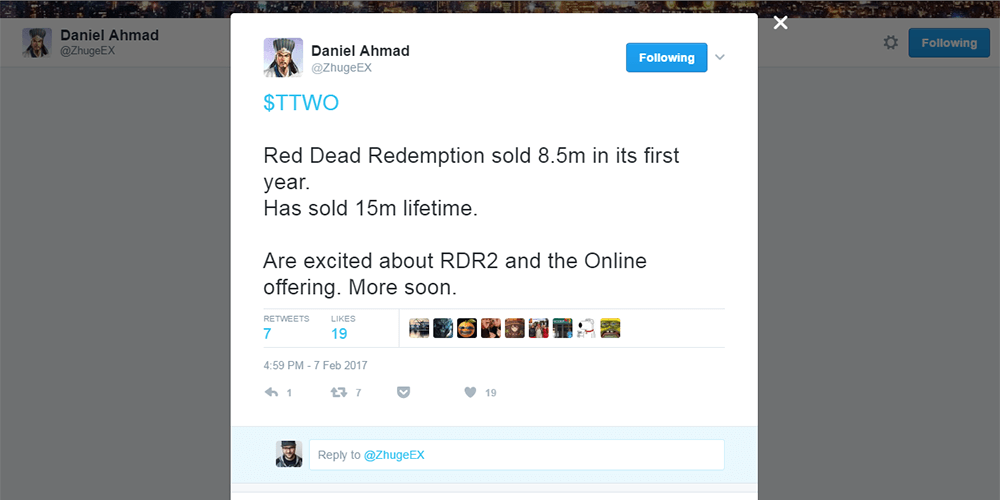My go-to advice when it comes to growing your following and creating shareable content has always been “create value.” It’s simple, easy to convey, and in most cases you can ask yourself “what are people getting out of this when I publish it?”
It fits into a pretty simple process:
- Find information people will find useful
- Convey it in a way that is easily accessible and is processed quickly
- People will discover your content through hashtags or retweets and share that information, either out of gratitude or because it will enrich their audience
- You will grow due to people wanting similar information
- You gain credibility and expertise which allows for further opportunity
This is what content creation is in a nutshell, but it’s always good to find a concrete example that you can follow along with. This is where Daniel Ahmad comes in.
Daniel tweets from @ZhugeEX on Twitter, and his area of expertise is about the video games industry. He works at Niko Partners, a firm that covers the games market in China and Southeast Asia. Because of this (and perhaps his own interest), he posts a lot of statistics about game sales, news releases, highlighted passages about how PR is spun, and criticisms of how games are covered in the press.
He does all this through a very distinct and concise style, which makes it very share-friendly. I’ve come to trust his ability to curate information, either by what he finds or what he retweets.
The Chart
If you hang around a subreddit long enough, you’re likely to run into the argument about “low effort content” like memes and image macros. People posit that because the image is much easier to process in a shorter amount of time (usually a few seconds) it’s much more likely to be upvoted.
This is true, but you cannot put a gun to someone’s head and guilt them into absorbing dense information if they don’t have a reason to care.
Ahmad will frequently take statistics, make a simple chart, and have that as a tweet image. This makes processing that information much more easier, and makes it more eye-catching.
It seems really simple, but imagine how this would work if it was just text. More reading, more processing, more time for distraction; you need to be able to make it apparent why your information is important, especially if comparison is involved. Your expertise is what allows you to form the context that people will respond to.
The Factoid
Sometimes you can say exactly what you need to in a sentence. The thing is, you need to ask yourself if you’re the right person to say it. An example of this is when Dan tweets something like this:
This seems pretty general, but it’s something I didn’t know before and adds some context about why the numbers are important. This is something I could see myself retweeting (and other people do) because it’s a “smart” fact. Sometimes, all it takes for something to be shared is it making the sharer seem more informed and intelligent.
This type of tweet carries over to esports, especially when there is a mountain of statistical data for a lot of games like League of Legends, Dota, or Smash Bros. It just takes the right kind of mind to be able to find what information will pique interest: what trends are people not seeing? What isn’t immediately obvious? What will bring value to your audience?
The Commentary
Part of what I dislike about reading gaming sites right now is that it seems to fall into the trap that bigger outlets have, too: politics is too alluring a subject in order to avoid. While “What does Trump’s election mean for the Nintendo Switch?” posts can drive a lot of traffic, but it also risks alienating audiences and making content feel shoehorned in to things that don’t relate to each other.
While Ahmad will criticize the gaming industry, it never really crosses a line that turns it into an incisive moral discussion. I find this refreshing, because I know exactly what I’m going to get from him: information, context, and sources I can use if I want to explore for my own conclusion.
Most opinions are limited to the subject at hand and allow him to flex his experience with the subject; at its core, this is what you want to do because it backs up your status and re-proves that you are worth paying attention to. It’s a pretty simple chain:
- Gather knowledge that is not easily parsable or boring to consume
- Share it in order to show you know what you’re talking about in a way that’s engaging
- Use that credibility to be believable when doing looser commentary on other issues
It’s difficult to explain this mostly because I do not want to tell people “stay in your lane,” especially when people feel passionately about subjects. For many people, using a large platform to increase awareness of issues is a noble pursuit, and I’m not going to stop them.
However, I find that people respond better when internal voice and content is consistent and authentic. Tweeting in a specific way for months, only to hard-left into personal subjects (especially when there’s no previous precedent) can leave people confused and a bit irritated.
By all means, you’re allowed to do it, but you need to prepare for that feedback and understand where it’s coming from. For many people, following your work is because it brings a specific utility into their lives, and you have to decide how much disrupting that consistency means to you. It comes with the decision of how personal you want to be with your account and brand strategy as a whole; this is a more advanced concept, and something that requires a lot more balance and maintenance.
I hope this helps you understand what I mean by creating direct value, and putting it in an easy-to-process package. Sometimes, it’s not about any specific gimmick besides knowing what you can say in a voice that others can’t. Good luck!


Leave a Reply